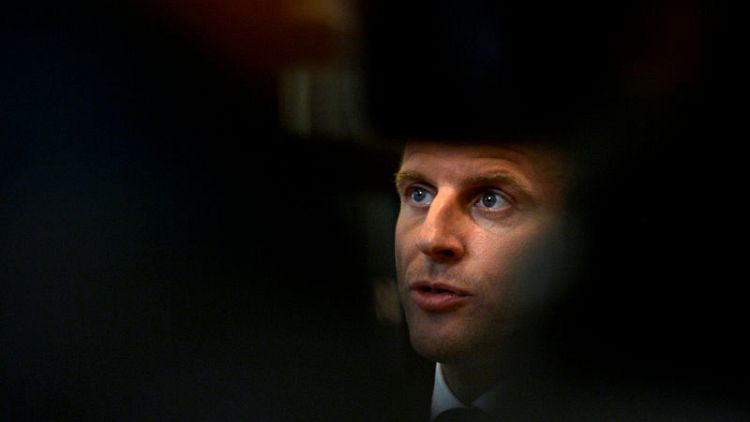By Richard Lough
BRUSSELS (Reuters) - European Union outsider nations courting accession to the club face dimmer prospects after French President Emmanuel Macron refused to countenance further enlargement until the bloc speeds decision-making and restores its credibility.
Frustrated at fellow leaders' inability to agree on who should hold the top EU jobs shaping policy for more than half a billion citizens, Macron on Monday gave a testy "non" to others joining the club for now.
Supporters of EU eastward expansion argue it will better buttress against growing influence of Russia and China.
France, however, worries expansion would leave decision-making even more unwieldy and could embolden nationalist parties.
North Macedonia and Albania would be the first victims of Macron's pique if he follows through - after their desire for membership talks was already waylayed by more than a year.
An ardent Europhile whose party came second to the far-right in May's European elections, Macron said Europe's prestige was at stake if the bloc was constantly held hostage by minority groups, with tough decisions needed on issues ranging from climate change to migration.
"I am more than sceptical towards those who say that the future of Europe lies in further enlargement, when we can't find agreement between 28 nations," Macron said as he left fruitless all-night negotiations in Brussels on Monday. "And I am insistent on the fact that I will refuse all forms of enlargement before deep reform to the way we function institutionally."
ONCE THEY WERE SIX
For decades, the EU, which began life as a post-war six-country economic community created to foster peace and trade, has struggled to balance enlargement with deeper economic and political cooperation.
It now stretches from Portugal in the west to former communist states once in Moscow's orbit to the east.
The Balkan states of Kosovo, Serbia, Montenegro and Bosnia and Herzegovina all seek entry.
German Chancellor Angela Merkel has publicly expressed support for North Macedonia beginning accession talks. Her state minister for Europe, Michael Roth, told Reuters that EU foreign and security policy would be judged on maintaining peace, democracy and stability across Europe as a whole.
"We cannot give up on enlargement. This would not be in German nor European interests," Roth said. "Accession is linked to clear requirements. It has to stay like that."
North Macedonia hopes the resolution of its long-running name dispute with Greece will be its ticket in.
Albania, perceived as one of Europe's most corrupt countries that has failed to combat money laundering, faces stronger resistance from northern European states.
Most decisions in the European Council - the intergovernmental part of the EU's decision-making where leaders decide on broad policy outlines - require a qualified majority. Even so, finding agreement on hot-button matters such as migration policy and climate change has proved tough.
VETO POWER
Enlargement requires unanimity, meaning Macron would have power of veto. The Netherlands also sided with France when the pair first unexpectedly blocked the start of EU talks for Albania and North Macedonia in June, 2018.
When push comes to shove, however, it is unclear whether Macron would wield a veto - especially if Germany is in support.
"Nothing new from Macron. When he says enlargement he means final accession - so true, we need to be institutionally ready for new member states," one European official said, downplaying his stance.
In a potential early test, North Macedonia's media reported its and France's prime ministers would meet on the sidelines of an EU-western Balkans conference in Poland on Friday and try to secure commitment for a date for accession talks approval.
Failure by the EU to show North Macedonia commitment to membership negotiations risks undermining the bloc's efforts to encourage reforms in the Balkans, said Nikola Burazer at the Belgrade-based Centre for Contemporary Politics.
"If it is not rewarded, that would be a signal for all the countries in the Western Balkans that their EU (outlook) is not certain," Burazer said.
Former Albanian foreign minister Ditmir Bushati said there was no reason why the reforms Macron sought could not run simultaneously with accession talks.
"We are not asking for the date to join the EU," he told Reuters. "We are asking to start the negotiations process, which will be challenging, long and painful for countries like Albania."
(Reporting by Richard Lough; Additional reporting by Robin Emmott and Andreas Rinke in Brussels, Kole Casule in Skopje, Tsvetelia Tsolova in Sofia, Benet Koleka in Tirana and Aleksandar Vasovic in Belgrade; Editing by Andrew Cawthorne)
